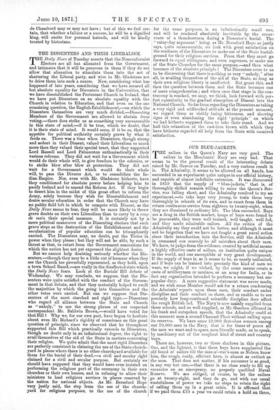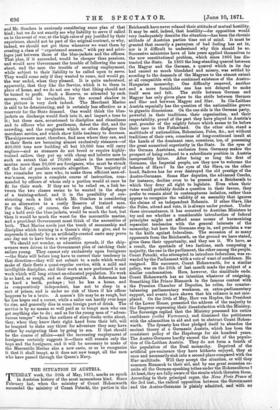OUR BLITE-JACKETS.
THE sailors in the Queen's Navy are very good. The sailors in the Merchants' Navy are very bad. That seems to be the general result of the interesting debate raised by Mr. Graves on Tuesday, and a very curious result it is. The Admiralty, it seems to be allowed on all hands, has- succeeded in an experiment quite unique in our official history, and capable of almost indefinite extension. It was discovered in 1859 that the supply of "blue-jackets," that is, of thoroughly skilled seamen willing to enter the Queen's Ser- vice, was falling short, and the Admiralty resolved to try an experiment,—to take boys very young, to train them very thoroughly in schools of its own, and to exact from them in return continuous service from eighteen to twenty-eight, when they are dismissed to ordinary life. The idea succeeded. Boys are a drug in the British market, heaps of boys were found to be procurable, they were well trained, well taught, well fed, and they made admirable sailors. All the critics of the Admiralty say they could not be better, and although it must not be forgotten that we have not fought a great naval action since their introduction into the Service, still the Admirals in command can scarcely be all mistaken about their men. We have, to judge from the evidence, created by artificial means a highly effective caste of sailors, an institution quite unique in the world, and one susceptible of very great development.- If the supply of boys is, as it seems to be, so nearly unlimited, and if boys can be trained into precisely the kind of men we- want, we might,- if we wished, by the same means create a caste of artillerymen or marines, or an army for India, or in fact any organization intended to perform a necessary but un- popular duty. A more suggestive statement was never made, and we wish some Member would ask for a return condensing the Admirals' reports upon these men, their conduct under discipline and their conduct on shore, and so enable us to see precisely how long-continued scientific discipline does affect the rough British lad. The Navy is now mainly supplied from these schools, and so well supplied, as Mr. Goschen affirmed in his frank and outspoken speech, that the Admiralty could at this moment man a second Channel Fleet without calling upon its reserves. We have some 19,000 first-class seamen among our 70,000 men in the Navy, that is for times of peace all the men we want and to spare, men literally made, so to speak, by machinery out of the roughest kind of street and country boys.
There are, however, two or three shadows in this picture. One, and the lightest, is that these boys have supplanted the old breed of sailors till the man-o'-war's-man as Nelson knew him, the rough, ready, efficient hero, is almost as extinct as the moa. That does not matter, if his successor is as good, in any way but one,—that there is no class ready to ffil up vacancies on an emergency, no properly qualified Naval Reserve. We are obliged, of course, to let the sailors go at twenty-eight, and they de go, and with our usual wastefulness of power we take no steps to retain the right of calling them up in a great crisis. It is affirmed that if we paid them £10 a year we could retain a hold on them,
and Mr. Goschen is anxiously considering some plan of that kind ; but we do not exactly see why liability to serve if called on in the event of war, at the high rates of pay justified by their experience, should not be part of the original contract, or why, indeed, we should not get them whenever we want them by creating a class of "experienced seamen," with pay and privi- leges just between those of the blue-jackets and the officers. That plan, if it succeeded, would be cheaper than pensions, and would save Government the trouble of following the men about, and the men the trouble of securing employment, while subject to their liability to be called upon to serve. They would come only if they wanted to come, and would go, the war ended, when they pleased. It is quite understood, apparently, that they like the Service, which is to them in place of home, and we do not see why that liking should not be turned to profit. Such a Reserve, so attracted by such means, would be invaluable, for the second shadow in the picture is very dark indeed. The Merchant Marine is said to be deteriorating, and is certainly less effective as a reservoir for the State demand. One would think the blue- jackets on discharge would flock into it, and impart a tone to it ; but these men, accustomed to discipline and cleanliness and to officers who are gentlemen, detest the dirt, and the crowding, and the roughness which so often disfigure the merchant service, and which show little tendency to decrease. The shipowners must, therefore, find men where they can, and as their fleets are becoming almost exclusively steamers—of 400,000 tons now building all but 10,000 tons will carry engines—and as steamers do not breed or require highly- trained sailors, they put up with cheap and inferior men to such an extent that of 70,000 sailors in the mercantile marine more than 20,000 are foreigners, who must be struck off the list of possible recruits altogether. The majority of the remainder are men who, to make them efficient men-of- war's-men, require a complete course of instruction, com- manded by officers of whom only a portion would at once be fit for their work. If they are to be relied on, a link be- tween the two classes seems to be wanted in the shape of a training-school, and it is the possibility of con- structing such a link which Mr. Goschen is considering as an alternative to a costly Reserve of trained men. For the Navy, of course, the first plan, that of retain- ing a hold over the blue-jackets, would be much the best, but then it would be much the worst for the mercantile marine, and a provident Government must think of the necessities of both. That Marine needs just the touch of seamanship and .discipline which training in a Queen's ship can give, and to -supersede it entirely by an artificially-created caste may prove .one day not to have been a wise policy.
We should not wonder, as education spreads, if the ship- -owners were driven to the Government plan of catching their sailors young. They cannot rely exclusively upon foreigners —the State will before long have to correct their tendency in that direction—they will not submit to a code which would make of their fleets a quasi-regular service, with a mild and intelligible discipline, and their work as now performed is not work which will long attract an educated population. No work is so hard, so rough, and so disagreeable. A fisherman has as hard a berth, perhaps ; but he has a home, and is comparatively independent, has not to sleep in a sort of prison, and is under no risk of blows if his officer 'happens to be a brute. A mason's life may be as rough, but the has hopes and a career, while a sailor can hardly ever hope t o rise, and generally dies in some foreign port of drink. The service is by no means so well paid as to tempt men who can get anything else to do ; and as for the young men of "adven- turous temper" whom the authors of story-books write about, they, when they know their right hand from their left, will be tempted to slake any thirst for adventure they may have rather by emigrating than by going to sea. If that should be the course of affairs—and the increasing employment of foreigners certainly suggests it—there will remain only the boys and the foreigners, and it will be necessary to make of the Mercantile Marine also a new caste, or so to reorganize it that it shall tempt, as it does not now tempt, all the men who have passed through the Queen's Navy.



































 Previous page
Previous page